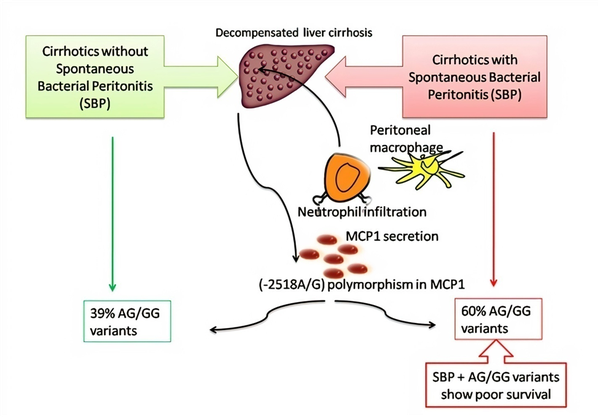-
Home
-
About JCTR
-
Gold Open Access
-
Issues
-
Editorial board
-
Author guidelines
-
Publication fees
-
Online first
-
Special issues
-
News
-
Publication ethics
-
Partners
-
Submit your manuscript
-
Submit your review report
-
Editorial Office
-

This work is licensed under a Creative Commons Attribution-NonCommercial 4.0 International License. ISSN print: 2382-6533 ISSN online: 2424-810X
Volume 7 issue 3
Cirrhotics with monocyte chemotactic protein 1 polymorphism are at higher risk for developing spontaneous bacterial peritonitis – A cohort study
K Vamsi Murthy#, Meenu S#, Thiagarajan Sairam*, Venkatakrishnan L*, Ramalingam Sankaran*
Murthy et al. J Clin Transl Res 2021; 7(3):6
Published online: May 27, 2021
Abstract
Background: Spontaneous bacterial peritonitis (SBP) is a complication of liver cirrhosis and its occurrence portends poor patient survival. There is emerging evidence that genetic predisposition could significantly alter the occurrence and course of SBP. Monocyte chemotactic protein 1 (MCP1) is a potent chemokine that perpetuates the pro-inflammatory milieu in SBP.
Aim: This study aimed at investigating MCP1 genotype polymorphism and its survival impact in patients with decompensated liver cirrhosis.
Methods: We recruited 107 individuals with decompensated liver cirrhosis and categorized them into 2 groups. Patients having SBP formed the cases (Group 1) and controls were patients without SBP (Group 2). MCP1 polymorphism (-2518A/G) was assessed in both groups by restriction fragment length polymorphism (RFLP) method. The Chi-square test was used to assess the differences in categorical variables and Kaplan Meier analyses were used to assess the survival.
Results: Patients with SBP (36.5%) had higher frequency of G allele than patients without SBP (23%) (p = 0.031; OR = 1.955, 95% CI: 1.0553 - 3.6216). Kaplan Meir analysis revealed that presence of SBP (p = 0.030) and G allele (p = 0.021) had significantly reduced the likelihood of survival among cirrhotics.
Conclusions: Cirrhotic patients with MCP1 G allele have a higher risk for developing SBP. In general, the presence of the MCP1 polymorphic G allele (AG/GG genotype) reduced the likelihood of survival among patients with cirrhosis.
Relevance for patients: This study identifies a critical subgroup of patients with SBP and also predicts prognosisin these individuals. The presence of this genetic polymorphism in addition to the underlying clinical condition may prompt aggressive monitoring, treatment and follow up.

DOI: http://dx.doi.org/10.18053/jctres.07.202103.006
Author affiliation
1. Department of Gastroenterology, PSG Hospitals, Coimbatore, Tamil Nadu
2. PSG Center for Molecular Medicine & Therapeutics, PSG Institute of Medical Sciences & Research, Coimbatore, Tamil Nadu
3. Present Address: Academic Research Consultant (Molecular Biology), Coimbatore, Tamil Nadu, India
# Authors contributed equally
*Corresponding Authors
Thiagarajan Sairam
PSG Center for Molecular Medicine and Therapeutics, PSG Institute of Medical Sciences & Research, Coimbatore - 641 004, Tamil Nadu, India.
Tel: +91 9488534592
Email: thiagarajan.sairam@gmail.com
Venkatakrishnan L
Department of Gastroenterology, PSG Hospitals, Coimbatore-641 004, Tamil Nadu, India.
Tel: +91-422-2570170
Email: lvenkat_krishnan@yahoo.co.in
Ramalingam Sankaran
PSG Center for Molecular Medicine & Therapeutics, PSG Institute of Medical Sciences &Research, Coimbatore-641 004, Tamil Nadu, India.Tel: +91-422-2570170, +91 9894618450
Email: drrampsg@gmail.com
Handling editor:
Michal Heger
Department of Pharmaceutics, Utrecht University, the Netherlands
Department of Pharmaceutics, Jiaxing University Medical College, Zhejiang, China

